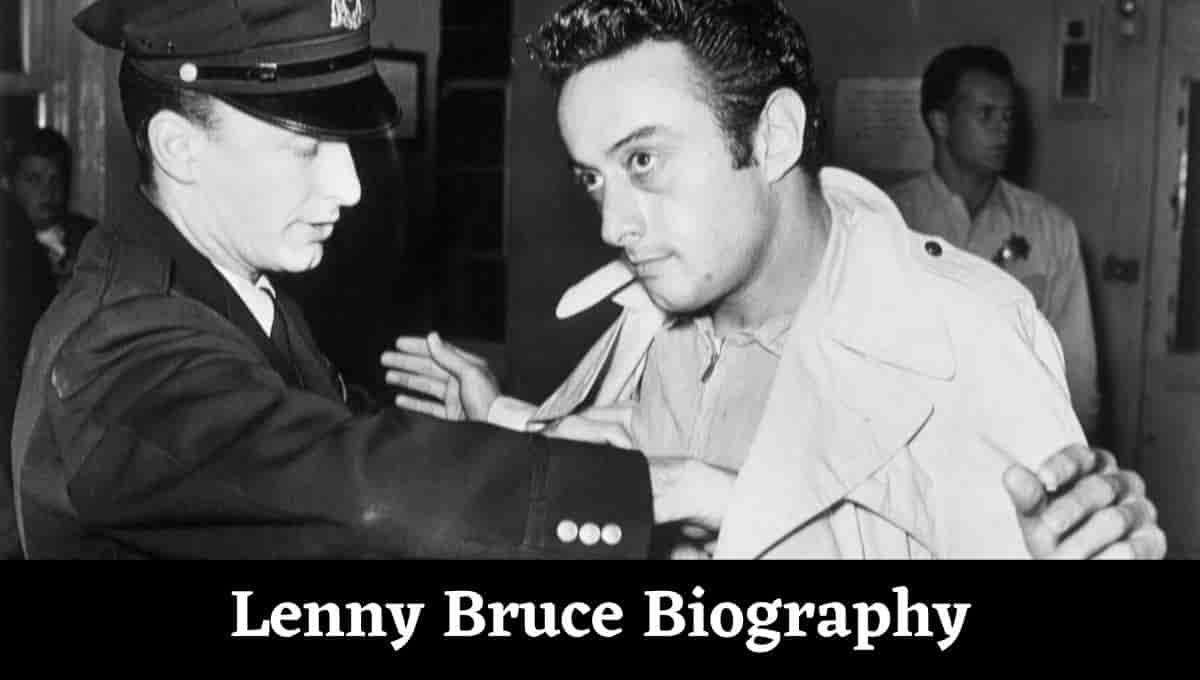Join Telegram Link for new update
Lenny Bruce Wiki, Wikipedia, children, net worth, death, suicide
Lenny Bruce Wiki, Wikipedia, Children, Net Worth, Death, Kill Yourself – Lenny Bruce, born Leonard Alfred Schneider in Mineola, New York on October 13, 1925 and died on August 3, 1966, was an American highly respected and controversial stand-up comedian, writer, social critic and satirist of the 1950s and 1960s. Much of his comedy focuses on taboos and the stigma of society at the time he lived. His 1964 obscenity sentence was followed by the first pardon in New York State history.
Lenny Bruce Wiki, Wikipedia, children, net worth, death, suicide
Lenny Bruce’s career
Early in his comedy career, Bruce wrote the screenplays for the comedy Dream Follies (1954), a low-budget film, and The Rocket Man (1954), starring himself, his wife Honey. Harlow and his mother Sally Marr. Along with skits, comedies and satirical interviews on the topics that made him famous – jazz, moral philosophy, politics, patriotism, religion, law, race, destruction pregnancy, drugs, Ku Klux Klan and Judaism – he has also released four original albums for Fantasy Records with headquarters in Berkeley. Lenny Bruce Originals Volume 1 and Volume 2 were then compiled and re-released in 1991.
Bruce personally produced and distributed two more records, one of which was the 10-inch album Live: San Francisco 1966, which featured 1961 performances in San Francisco that first got him into trouble. juridical. Other unreleased material about Bruce was available from the early to late 1950s through Fantasy, Alan Douglas, Frank Zappa and Phil Spector. At Enrico Banducci’s North Beach nightclub “The Hunger i,” which Mort Sahl had previously founded, Bruce refined the depth and tone of his material.
His growing fame led to him appearing as a guest on the critically acclaimed Steve Allen Show, where he made his debut with candid remarks about Elizabeth’s recent marriage. Taylor with Eddie Fisher and the question “Will Elizabeth Taylor become a Bar Mitzvahed?” It also began to receive media coverage.
Statement by Lenny Bruce
Broadway columnist Hy Gardner called Bruce “a fad” and “a quirky attraction”, while Variety called him “undisciplined and uninteresting”. Herb Caen, a prominent San Francisco journalist who was an ardent and earliest advocate, wrote in 1959:
Lenny Bruce is called a sick comedian, and he is sick. He’s sick of all the pretentious lies of a generation that make sense of his wicked humor. He’s a rebel, but not without reason, because there are shirts to take off, ones I need to deflate. You sometimes feel guilty laughing at some of Lenny’s cynical jokes, but that feeling goes away soon enough when an inner voice tells you with satisfied surprise, ‘but that’s it. truth.’
In the midst of a terrible blizzard, on February 3, 1961, he performed at Carnegie Hall in New York and celebrated it. It was recorded and eventually had a three-disc collection entitled Concerts at Carnegie Hall. Albert Goldman, the reviewer, gave the following description in the notes section:
This was the moment when an unknown but fast-growing young comedian named Lenny Bruce decided to give one of the best performances of his career. … The performance on this album is the performance of a child of the jazz era. Lenny worships the gods of spontaneity, honesty, and free association. He imagines himself as an oral jazz musician. His ideal is to go out there like Charlie Parker, hold that microphone in his hand like a horn and blow, blow, blow whatever comes into his head like it comes to his head, nothing is censored, nothing is translated, there is no intermediary, as long as he is a man with a clear mind, a clear head sends brain waves like radio waves into everyone’s head. men and women were sitting in that vast hall. Send, send, send, he will eventually reach the point of clairvoyance where he is no longer a performer, but a means of conveying messages that only come to him from there – from memory, fantasy, prophecy. To the extent that, like autographers, his language takes over his mind and he will say things he didn’t mean to say, things that surprise, delight, upset him – as if he were his own viewer. efficiency!
- Dr. Robert Levine Wikipedia
- Cameron Dawson Wiki
- Wikipedia about Philip Chisme
Categories: Biography
Source: vcmp.edu.vn
